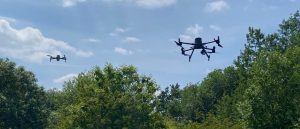Article

To fly a drone within the UK there are various rules and a regulations surrounding flying an unmanned aircraft, it doesn’t matter anymore whether you are flying commercially or as a hobbyist, what does matter is the level of risk!
The question is, do you need a license to fly your drone, this is very much dependent on the area in which you are flying and the weight of the drone you intend to fly.
For example if you are flying a drone weighing less than 250g such as the DJI Mini 2 then all you are required to do is complete the Drone and Model Aircraft Registration and Education Service (DAMARES) via the UK CAA, this must be completed to fly any drone (that is not classed as a toy) within the UK .
If you are responsible for a drone you must register as an Operator and gain an Operator ID, the cost of which is £9 and it is valid for one year, your Operator ID must be clearly displayed on your drone.
To fly your drone, you must register for a Flyer ID, to achieve this you will need to sit a short education package relating to the Drone and Model aircraft rules and regulations then pass a theory test, the test consists of 40 multiple choice questions of which you are to get 30 correct to obtain a pass, the flyer ID is free and is valid for five years.
If you intend to only fly your drone more than 150m from built up areas and groups of people, under the conditions of the A3 Subcategory of the Open Category you will be required to complete the DAMARES. An Operator ID and a Flyer ID is all you will require to fly a drone with a maximum take-off mass (MTOM) of 25kg with no further licensing requirements.
However, if you wish to fly closer to people the risk level is increased and therefore further qualifications are required to fly under certain conditions.
If you have a drone weighing more than 250g but less than 2kg such as a DJI Mavic 2 Pro which weighs just over 900g then you would be required to complete and pass an A2 Certificate of Competency to fly closer to people than permitted within the A3 Subcategory, this will allow flight up to 50m away from people not under your control.
If you are interested in completing your A2 CofC with RUAS Training Academy the course is now available for £79, for more information click here.
If you have a drone with a MTOM of more than 2Kg and wish to fly in an urban environment then the risk level is deemed higher so you would require a further qualification – the General VLOS Certificate (GVC).
The GVC Drone course has been developed for the operation of a drone with a MTOM of <25Kg within the Specific Category, the course includes various learning modules based on the syllabus dictated by the UK CAA, a written theory exam, a practical flight assessment and development of an Operations Manual.
If you are interested in completing your GVC with RUAS Training Academy the course is now available for £500, for more information click here.
The GVC qualification would then allow you to apply to the UK CAA for an Operational Authorisation based on the content of your Operations Manual – demonstrating how and where you intend to operate your drone. This Operational Authorisation is similar to the previous ‘standard permissions’ issued by the UK CAA under the legacy ‘PfCO’ – although one clear difference is the CAA no longer base the decision on whether the operations are being conducted under a commercial umbrella but now on the level of risk involved.
Liarne Fox
February 01